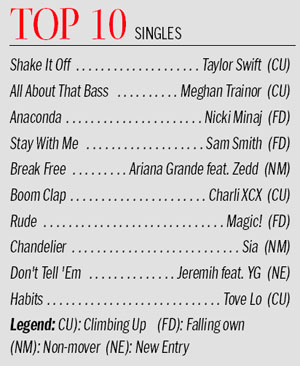|
Music
Zone
A fine balance of rap, alternative, modern rock & pop
Saurabh & Gaurav
Soul reinvents their basics with their most eclectic set
Spoon ó They Want My Soul (Loma Vista Recordings)
  One of the most
acclaimed rock bands of the last decade, Spoon returns from the
longest hiatus of its career, a time that saw leader Britt Daniel
teaming with Canadian pop singer Dan Boeckner of Wolf Parade to
explore musical boundaries with Divine Fits. From the restless
tambourine jangle of Rainy Taxi through the brooding roar and
churn of Knock Knock Knock, the band is in solid shape, and
back on the same page after a break filled by members branching out
into side projects. Many of the songs are meticulously crafted but
they also breathe and break with crackling spontaneity. Inside Outís
slow beat and softly executed rhythm provides a sparser effort where
shimmering keyboards delight. Like the rest of the best, Outlier
steps far beyond Spoonís stylistic norm. It fades up on the albumís
stickiest hook and Spoonís most overt dance groove, reminiscent of
Stone Rosesí Fools Gold. Throughout the album, the songs flow
into and out of each other with a subtle movement thatís hypnotic
and sounds deceptively simple. Britt Danielís voice is soulful,
tuneful and rough, helping his heartbreak-focused lyrics hit hard,
especially on Do You. The atmosphere and suspense builds up to New
York Kiss, a sparkling closer that creates the drama as Danielsí
voice reaches its apex under the weight of sheer emotional brilliance.
The album will undoubtedly win Spoon hordes of new fans and catapult
them to greater heights. One of the most
acclaimed rock bands of the last decade, Spoon returns from the
longest hiatus of its career, a time that saw leader Britt Daniel
teaming with Canadian pop singer Dan Boeckner of Wolf Parade to
explore musical boundaries with Divine Fits. From the restless
tambourine jangle of Rainy Taxi through the brooding roar and
churn of Knock Knock Knock, the band is in solid shape, and
back on the same page after a break filled by members branching out
into side projects. Many of the songs are meticulously crafted but
they also breathe and break with crackling spontaneity. Inside Outís
slow beat and softly executed rhythm provides a sparser effort where
shimmering keyboards delight. Like the rest of the best, Outlier
steps far beyond Spoonís stylistic norm. It fades up on the albumís
stickiest hook and Spoonís most overt dance groove, reminiscent of
Stone Rosesí Fools Gold. Throughout the album, the songs flow
into and out of each other with a subtle movement thatís hypnotic
and sounds deceptively simple. Britt Danielís voice is soulful,
tuneful and rough, helping his heartbreak-focused lyrics hit hard,
especially on Do You. The atmosphere and suspense builds up to New
York Kiss, a sparkling closer that creates the drama as Danielsí
voice reaches its apex under the weight of sheer emotional brilliance.
The album will undoubtedly win Spoon hordes of new fans and catapult
them to greater heights.
Best track: Outlier
Worst track: Let
Me Be Mine
A record of true thought and independent thinking
Shabazz Palaces ó Lese Majesty
(Sub Pop)
 After two years of
sustained silence and relative obscurity, the experimental hip-hop
outfit duo, Palaceer Lazaro (Digable Planets) and
multi-instrumentalist Tendai Maraire, have resurfaced again. Shabazz
Palacesí music is heavy and bizarre, existing at the intersection
between rap, jazz, funk, and electronic music. Where 2011ís Black
Up established Shabazz Palaces as one of the more adventurous duos
in hip-hop, Lese Majesty sees them don their creative suits, leaving
ordinariness behind. Like Black Up, the album is meant to be
listened to as one piece, rather than a collection of songs. The
tracks bleed into one another, and half of the 18 tracks are
interludes that last less than two minutes. On the lead single Cake,
the duo seems to be mocking strands of modern culture.
Production-wise, itís the albumís most accessible track. The first
section, entitled The Phasing Shift, sees the collection come
to life slowly as it wipes the sleep away. The pace escalates on Forerunner
Foray as Catherine Harrisíhazy vocals intertwine bass and synth
lines before They Come in Gold kicks into the duoís signature
sound. Solemn Swears follows and lyrically, it is possibly the
best moment on the album. Treasures await the patient listener who
skips to the middle of the record to hear the clever wordplay couplets
of Solemn Swears or the stuttering guitar sounds of Noetic
Noiromatics or the strangled voice samples leading into the megaphone
raps on Ishmael. After two years of
sustained silence and relative obscurity, the experimental hip-hop
outfit duo, Palaceer Lazaro (Digable Planets) and
multi-instrumentalist Tendai Maraire, have resurfaced again. Shabazz
Palacesí music is heavy and bizarre, existing at the intersection
between rap, jazz, funk, and electronic music. Where 2011ís Black
Up established Shabazz Palaces as one of the more adventurous duos
in hip-hop, Lese Majesty sees them don their creative suits, leaving
ordinariness behind. Like Black Up, the album is meant to be
listened to as one piece, rather than a collection of songs. The
tracks bleed into one another, and half of the 18 tracks are
interludes that last less than two minutes. On the lead single Cake,
the duo seems to be mocking strands of modern culture.
Production-wise, itís the albumís most accessible track. The first
section, entitled The Phasing Shift, sees the collection come
to life slowly as it wipes the sleep away. The pace escalates on Forerunner
Foray as Catherine Harrisíhazy vocals intertwine bass and synth
lines before They Come in Gold kicks into the duoís signature
sound. Solemn Swears follows and lyrically, it is possibly the
best moment on the album. Treasures await the patient listener who
skips to the middle of the record to hear the clever wordplay couplets
of Solemn Swears or the stuttering guitar sounds of Noetic
Noiromatics or the strangled voice samples leading into the megaphone
raps on Ishmael.
Best track: They
Came In Gold
Worst track: Soundview
Rating: ***
Triumphant in confidence and variety
Common ó Nobodyís Smiling (Def Jam)
 Commonís latest, Nobodyís
Smiling, centers on the war-torn streets of South Side, Chicago
that Common left nearly two decades ago, a setting the 42-year-old
rapper steers like a hard-bitten local. Itís only fitting that
Commonís longtime partner in music No I.D. handles the
entirety of the albumís production, and he sets a dark tone for the
project with stuttering drums, ominous guitar and piano lines and
muffled vocal clips. The Neighbourhood as an opener is a
compelling scene-setter, channeling Curtis Mayfieldís The Other
Side of Town. Featuring young Chi-Townís Lil Herb on a
striking verse, the song sets the motion for the rest of the album.
The beats are well-crafted, evocative and effective, bringing out the
best of Common and his recruits. He gives the disc more dimensions by
including a nostalgic banger Young Hearts Run Free and an
elegant elegy for the late producer and friend J Dilla with Rewind
That. Diamonds feels out of place sonically, but itís the
closest thing the album has to an anthem. Commonís latest outing
remains his most personal records in quite some time, reflecting on
the ups and downs of his relationship with No I.D. and
meditating on the loss of J Dilla. While not faultlessly executed,
Common arguably regains some of the relevance he may have lost from
his last couple of albums with the focus of Nobodyís Smiling. Commonís latest, Nobodyís
Smiling, centers on the war-torn streets of South Side, Chicago
that Common left nearly two decades ago, a setting the 42-year-old
rapper steers like a hard-bitten local. Itís only fitting that
Commonís longtime partner in music No I.D. handles the
entirety of the albumís production, and he sets a dark tone for the
project with stuttering drums, ominous guitar and piano lines and
muffled vocal clips. The Neighbourhood as an opener is a
compelling scene-setter, channeling Curtis Mayfieldís The Other
Side of Town. Featuring young Chi-Townís Lil Herb on a
striking verse, the song sets the motion for the rest of the album.
The beats are well-crafted, evocative and effective, bringing out the
best of Common and his recruits. He gives the disc more dimensions by
including a nostalgic banger Young Hearts Run Free and an
elegant elegy for the late producer and friend J Dilla with Rewind
That. Diamonds feels out of place sonically, but itís the
closest thing the album has to an anthem. Commonís latest outing
remains his most personal records in quite some time, reflecting on
the ups and downs of his relationship with No I.D. and
meditating on the loss of J Dilla. While not faultlessly executed,
Common arguably regains some of the relevance he may have lost from
his last couple of albums with the focus of Nobodyís Smiling.
Best track: Rewind
That
Worst track: 7
Deadly Sins
Rating: **
Segall's most intricately woven and patiently developed work
Ty Segall ó Manipulator (Drag City)
 Following last yearís
acoustic based Sleeper, Segallís newest release combines 1960s pop
sensibilities with contemporary psych flavours. With Manipulator, Segall
gainfully asserts that heís an extraordinary artist devoted to his
craft. The songs are often wildly different, but they cohere thanks to
a stronger Following last yearís
acoustic based Sleeper, Segallís newest release combines 1960s pop
sensibilities with contemporary psych flavours. With Manipulator, Segall
gainfully asserts that heís an extraordinary artist devoted to his
craft. The songs are often wildly different, but they cohere thanks to
a stronger
precision, which makes them more memorable and intricate. Rather than
dividing his attention and songwriting between different genres and
projects, heís thrown everything into the blender here, offering
rock, folk, metal, rock and sixties pop. Tracks such as The Singer feature
string sections giving a graceful sway to the album, while the
incessant electronic rhythm on The Connection Man adds to the
albumís wild-eyed impetuousness. On the sweet acoustic The Feels,
he sings of finding common ground. "Now I realise youíre the
same as me," he sings, and his voice is as high and sweet as it
has ever been. Particularly noteworthy is Whoís Producing You? an
unsparing look at the politics of recording fidelity in the digital
age. In contrast, The Clock is a classic rock masterpiece
complete with viola, violin, and cello backing. The arrangement is
unlike what Segall has done in the past, and the polished end result
is one of the most universally appealing songs on the album.
Best track:
The Clock
Worst track: The
Crawler
Rating ***

|